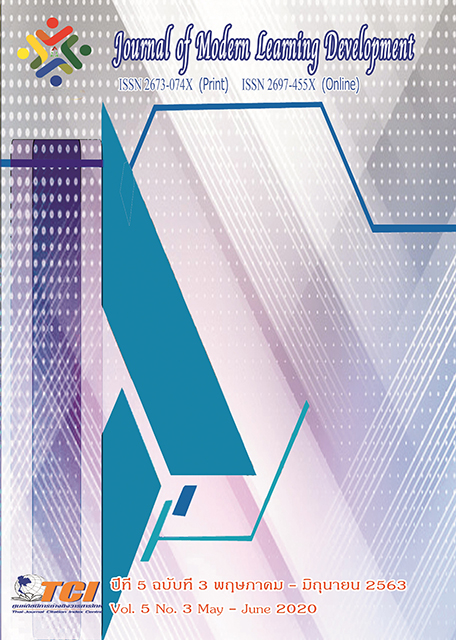The Political Economy of Epidemiology and Social Inequality
Main Article Content
Abstract
This article aimed to synthesize the concepts of epidemiology and social inequality via using political economy analysis with critical thinking which found that : The Pandemic was the recent drastic menaces affecting all countries in the meantime, those countries have been created social inequality by politic and economy causing the long term of stratification. The poor population groups without negotiation power were worse sufferers than the rich with power population groups because of their poverty inaccessible to the public health, ineffective immunity, and physical weakness from hard laboring. In a quarantine period, the riches had comfortable living with watching online movies for relaxing, on the other hand, the poor were lack of income caused by the suspension to prevent the outbreak. The pandemic crisis exploded the unfair economic and social justice which displayed the structural problems and the root causes explicitly. The social inequality made the underprivileged poor face the risks and get inaccessibility to the public services. The pandemic prevention might be a cause of their starvation death.
Article Details
References
โกมาตร จึงเสถียรทรัพย์. (2563). มานุษยวิทยากับโรคระบาด: โควิด-19 โรคอุบัติใหม่กับงานวิจัยทางมานุษยวิทยา. กรุงเทพมหานคร: ศูนย์มานุษยวิทยาสิรินธร (องค์การมหาชน).
ฉัตรทิพย์ นาถสุภา. (2556). เศรษฐศาสตร์การเมืองจากอดีตสู่อนาคต. วารสารเศรษฐศาสตร์การเมือง, 1(1), 15-21.
ดิเรก ปัทมสิริวัฒน์. (2553). นโยบายการคลังสาธารณะ. กรุงเทพมหานคร: แปลน พริ้นติ้ง.
เดือนเด่น นิคมบริรักษ์ และคณะ. (2556). โครงการพัฒนาแนวทางอภิบาลระบบหลักประกันสุขภาพ. กรุงเทพมหานคร : สถาบันวิจัยเพื่อการพัฒนาประเทศไทย.
ปิยะพงษ์ บุษบงก์ และ พบสุข ช่ำชอง. (2563). การออกแบบนโยบายที่ไม่ทิ้งใครไว้ข้างหลัง. เชียงใหม่: สถาบันนโยบายสาธารณะ มหาวิทยาลัยเชียงใหม่.
พลเดช ปิ่นประทีป. (2562). ความเหลื่อมล้ำด้านสาธารณสุข. กรุงเทพมหานคร: คณะกรรมการสุขภาพแห่งชาติ.
มอริซ แครนสตัน. (2562). ปรัชญาการเมือง. (พิมพ์ครั้งที่ 4). กรุงเทพมหานคร: สยามปริทัศน์. ส. ศิวรักษ์ แปล.
สถาบันพระปกเกล้า. (2562). ก้าวข้ามความเหลื่อมล้ำ : ความท้าทายของสังคมไทย. กรุงเทพมหานคร: สถาบันพระปกเกล้า.
สมชัย จิตสุชน. (2558). ความเหลื่อมล้ำในสังคมไทย: แนวโน้ม นโยบาย และแนวทางขับเคลื่อนนโยบาย. กรุงเทพมหานคร: ธนาคารแห่งประเทศไทย.
สฤณี อาชวานันทกุล. (2554). ความเหลื่อมล้ำฉบับพกพา. นนทบุรี : สำนักงานปฎิรูป (สปร.).
สุปรียา หวังพัชรพล และคณะ. (2559). ความเหลื่อมล้ำและคนจนเมือง. กรุงเทพมหานคร: สำนักงานกองทุนสนับสนุนการวิจัย.
อรรถจักร์ สัตยานุรักษ์ และคณะ. (2563). สรุปผลการสำรวจคนจนเมืองในภาวะวิกฤติโควิด-19 และข้อเสนอแนะต่อรัฐบาล. กรุงเทพมหานคร: สำนักงานกองทุนสนับสนุนการวิจัย.
อารยะ ปรีชาเมตตา และคณะ. (2560). พลวัตการเปลี่ยนแปลงเศรษฐกิจไทยในเชิงพื้นที่กับปัญหา ความเหลื่อมล้ำ. กรุงเทพมหานคร: สำนักงานกองทุนสนับสนุนการวิจัย.
Farmer, P. (2004). Pathologies of power: health, human rights, and the new war on the poor. Berkeley: University of California Press.
Gans, J. (2020). Economics in the Age of COVID-19. New England : MIT Press.
Harari, Y. N. (2561). Sapiens A Brief History of Humankind (เซเปียนส์: ประวัติย่อมนุษยชาติ). นำชัย ชีววิวรรธน์ แปล. กรุงเทพมหานคร: ยิปซี.
Kleinman, A. Das, V. and Lock, M. (1997). Social Suffering. Berkeley: University of California Press.
Kurian, G. T. (2011). The encyclopedia of political science. Washington : CQ Press.


